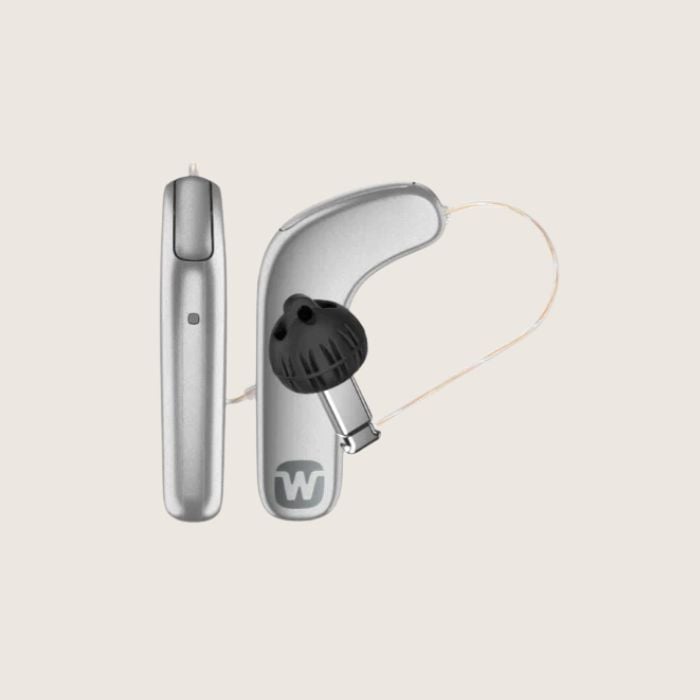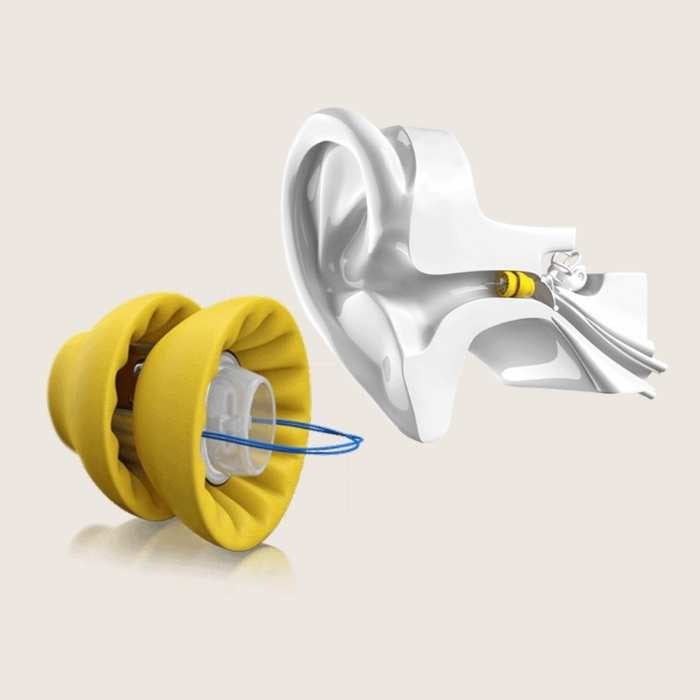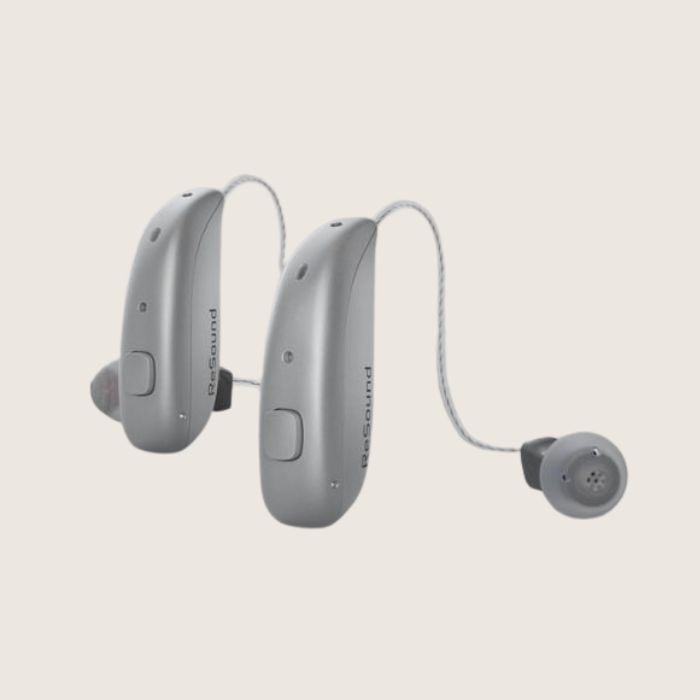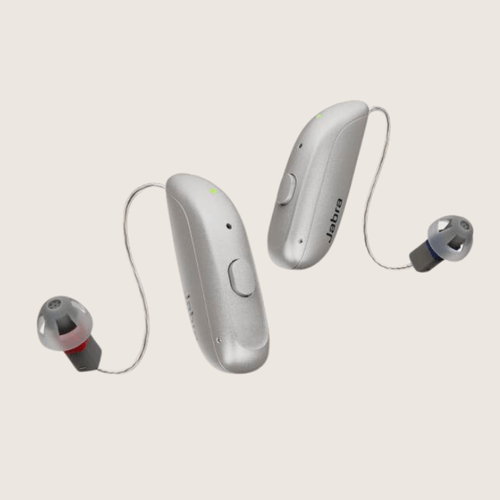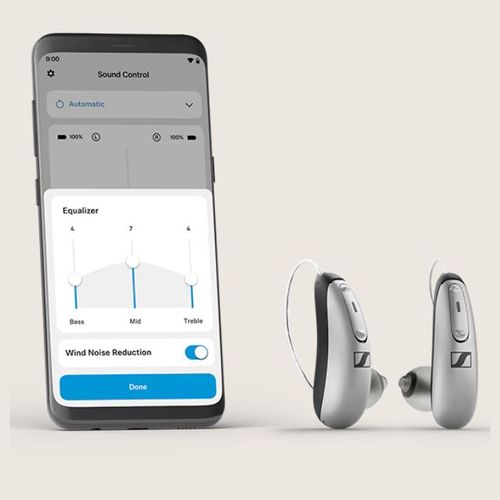As an audiologist, I have had the opportunity to work with numerous patients facing a common yet often distressing issue: tinnitus. I've seen firsthand how challenging it can be for individuals to find effective relief from persistent ringing, buzzing, or hissing in their ears.
During my doctoral program at the University of Iowa, I learned about some of the world's leading tinnitus management strategies including Dr. Richard Tyler and others.
I also learned about the important role that hearing aids can play in treatment. This guide is designed to provide you with all the essential information you need to address tinnitus, including the best hearing aids available today to help manage and alleviate your symptoms.
Whether you are newly diagnosed or have been struggling with tinnitus for years, I hope you’ll find the guide below as practical as it is research-backed.
Quick Links
- Best Budget Option - Sennheiser All-Day Clear
- Best Mid-Range - Jabra Enhance Select
- Best For Tinnitus-Specific Features - Widex SmartRIC
- Best For Tinnitus At Night - Phonak Lyric
- 50+ hearing aid brands reviewed and rated by our team of hearing aid wearers and audiologists
- 200+ hours each month spent researching brands and care options
- 2,000,000 people shopped on Soundly in 2024
- 100% independently owned and operated
Read more about our company, services and process here.
Featured in this article

The 6 Best Tinnitus Masking Hearing Aids According to Our Tests 👇
We've broken the list below into two groups: hearing aids you get at a local clinic and those you purchase directly. Typically local clinic devices are more advanced and more customized while direct-to-consumer hearing aids are more affordable and convenient. We'll start with our favorites at local clinics.
- Widex has the most robust tinnitus features on the market including targeted masking and very natural outside-world sound
- Phonak Lyric is the only device on the market that stays in your ears 24/7 - great for folks with night-time tinnitus
- ReSound NEXIA has a dedicated tinnitus-focused app and robust frequency targeting
- Oticon Intent offers a smoother and more mellow sound quality that can be more comfortable for sound-sensitive wearers
Widex SmartRIC
- Full-featured prescription hearing
- Unique L-shaped design
- Strong tinnitus management features
- Lowest-delay sound processing
The Widex SmartRIC is the latest flagship receiver-in-canal device from the brand, released in early 2024. It stands out in several key ways.
- First, the SmartRIC boasts the lowest sound delay on the market—by a significant margin. For years, Widex has prioritized rapid sound delivery from the environment to your ears, creating a natural sound quality that many users praise. Its L-shaped design enhances background noise handling without relying on heavy algorithms that could slow down performance.
- Additionally, the Widex SmartRIC is highly recommended for those prioritizing tinnitus treatment. Its onboard tinnitus programs are well-reviewed and offer audiologists a variety of options for fine-tuning and adjustments.
Overall, the Widex SmartRIC is well-respected among audiologists and hearing experts. To purchase this device, you'll need to consult with a local clinic.
- Focused on sound quality, delivering clear sound with the lowest delay in the industry.
- Includes industry leading tinnitus features.
- Widex SmartRIC hearing aids come with rechargeable batteries and Bluetooth streaming capabilities.
- Only sold through local clinics. Remote adjustments require an additional accessory.
- Widex offers a premium product at a premium price that may be out of budget for some.
- Less advanced smartphone app
- Widex SmartRIC is a fully customizable, prescription hearing aid appropriate for mild-severe hearing loss
- If you have severe hearing loss, your care provider may fit you with a custom earmold to reduce feedback
- If you have profound hearing loss, you may be a better fit for a high-powered BTE style (currently available in Widex's previous generation, Widex Moment)
- Widex SmartRIC is a prescription device fit and programmed by a professional
- Widex RemoteLink neck loop is required for remote follow-up programming (requires registering in the hearing clinic's software)
- Widex has the fastest processing time among all major hearing aid manufacturers
- Widex is a favorite choice of musicians and audiophiles
- The SmartRIC features microphones at a 20-degree, near horizontal placement on its unique L-shape. This placement is especially helpful in background noise for better directional focus.
- Widex SmartRIC comes in in a comfortable receiver-in-canal style that is easy to wear all day
- Sits behind the ear with a receiver (speaker) that reaches into the ear canal
- Widex SmartRIC is the shortest slim RIC on the market
- Choose between five color options, including neutral colors (tech black, dark cherry, honey blonde, silver grey) and fun colors (rose gold)
- Widex SmartRIC comes with rechargeable batteries and a rechargeable case that holds 5 days of charge
- Get 37 hours on a 4-hour full charge (no streaming)
- A quick charge of 30 minutes yields 8 hours of battery life
- Widex SmartRIC allows Bluetooth streaming, music listening, and phone calls across all models. iPhone users can take calls hands-free, while Android users must keep their phones close to pick up outbound audio
- Widex SmartRIC uses Apple's MFI connection and Android's ASHA connection to stream content through Bluetooth
- Widex SmartRIC is reasonably easy to handle but does require the wearer to place the hearing aid behind their ear and insert the receiver into the ear (consistent across all behind-the-ear styles)
- Widex SmartRIC includes a push button for on-the-go volume and program changes
- Widex SmartRIC is water resistant with an IP rating of 68
- This hearing aid can withstand dust and water submersion in one meter of water for up to 30 minutes
- Remote care: to access remote care, you'll need the RemoteLink neck loop and Widex Remote Care app
- Customization: volume, programs, MySound personalization
- Tinnitus masking: created by your hearing care professional or using the Widex ZEN app
- Find my hearing aid: yes - app feature
- Health tracking: not available
Phonak Lyric
- Smallest hearing aid available, designed to sit fully in the ear canal for 24/7 wear
- Replaced every 6-8 weeks for consistently fresh performance
- Waterproof, allowing for swimming and showers without removal
- Delivers natural analog sound with minimal processing, but limited background noise management
Phonak Lyric is a truly unique hearing aid on the market, offering an entirely invisible, "set it and forget it" solution for users seeking simplicity and discretion.
- Effortless Wear: Lyric is designed for continuous, worry-free wear. It stays in place 24/7 and is replaced every 8 weeks by a professional, making it an excellent option for those who prefer not to manage their hearing aid daily. Some users can even learn to change it at home.
- Complete Discretion: Lyric’s position deep in the ear canal makes it truly invisible. Even with close inspection, it’s undetectable, giving users complete confidence in its discreteness.
- Ideal for Dexterity Challenges: With no daily handling required, Lyric is ideal for individuals with dexterity issues or those who prefer a low-maintenance solution. Its effortless setup offers ease without compromising on hearing clarity.
Phonak Lyric combines practicality and innovation, making it a compelling choice for anyone that has the time and resources to go this route.
- Totally invisible Wear 24 hours a day including workouts and water
- Clear sound that uses the natural shape of the ear
- Expensive at $4,000 per year
- Includes in-person changes every 8 weeks
- Lack of background noise suppression technology
- No Bluetooth streaming
- Phonak Lyric hearing aids are appropriate for mild-severe hearing loss
- If you have profound hearing loss, you are a better fit for higher-powered RIC or BTE hearing aids
- Phonak Lyric hearing aids are prescription devices fit and programmed by a professional
- You will return to your audiologist every 8 weeks for hearing aid replacements
- Some users learn to make hearing aid changes themselves at home using a special insertion tool
- Phonak Lyric uses analog sound, preferred by some users, though it lacks advanced background noise management features.
- Lyric benefits from the natural acoustics of the ear canal, which can help improve background noise handling.
- After an initial adjustment period, Phonak Lyric becomes comfortable for most users, with many reporting they forget they're even wearing hearing aids.
- Sit deep inside the ear
- Replaceable using a special insertion tool at your local clinic
- Phonak Lyric devices have an onboard battery that lasts 6-8 weeks, after which the entire unit is replaced.
- Phonak Lyric does not come with Bluetooth streaming
- Phonak Lyric is professionally placed and stays in the ear for 6-8 weeks, making it ideal for users with dexterity challenges.
- Phonak Lyric is water-resistant, allowing for light swimming, daily showers, and exposure to humidity.
- Phonak Lyric does not have an app
- Volume and program changes are made using a magnetic wand accessory
ReSound NEXIA
- ReSound Nexia is one of the smallest RIC hearing aids available
- Auracast-enabled for seamless Bluetooth streaming, developed in collaboration with Bluetooth SIG
- Impressive 30-hour battery life on a single charge, ideal for all-day wear
- Strong performance in background noise, enhancing clarity in busy environments
- Custom prescription programming provided by a local audiologist
ReSound Nexia stands out for its legacy of innovation and modern design. Here’s what makes it a top pick:
- Proven Expertise: ReSound has led the hearing aid industry with tech-first developments, from the earliest made-for-iPhone hearing aids to today’s Auracast-enabled models. With millions of users worldwide, ReSound brings trusted experience and reliability.
- Discreet Design: NEXIA is the smallest receiver-in-canal (RIC) hearing aid we’ve reviewed, offering a low-profile option that’s especially helpful if you wear glasses or prefer subtlety.
- Powerful Battery: With 30 hours of life on a single charge and a portable charger, Nexia provides extended wear and convenience, ideal for users who are on the go.
- Superior Background Noise Handling: Nexia’s advanced beam-forming tech and innovative in-ear microphone deliver exceptional clarity in noisy environments, making it one of the best in the market for handling complex soundscapes.
ReSound NEXIA combines sleek design with high-performing technology, ideal for those who want both discretion and power.
ReSound NEXIA receives strong reviews for its crisp sound quality. Some users note issues with Bluetooth connectivity on Android devices and slight discomfort from the in-ear M&RIE receiver. Read more reviews via our partners at ZipHearing.
- "I had gotten so used to diminished hearing, I had no idea what I was missing. I no longer say “can you repeat that” or “what?” And my phone rings in my ear and all I have to do is tap the unit behind my ear. No more fumbling to get me phone out of my pocket in time to answer." - Richard
- "I love my new Resound Nexia 9. They seem to pick up sounds my previous 5-year old hearing aids picked up and they seem to process background noise much better. I am very happy with my purchase." - Mitch
- "My new Nexia “ears “ are very comfortable behind the ears. They seemed very loud at first but I have adjusted and are obviously better than my old “ears” . The sound is clear and less tinny . I can hear a phone conversation very clearly using the Bluetooth ability, although I still need my phone very close for the caller to hear me. After a day of wearing my “ears” the left one hurts, I think from the wire, however I have not had a follow up appointment so that may be fixable. The right side is no problem." - Fiona
- "The rechargeable battery is a HUGE plus—no more keeping batteries on me at all times. The moisture resistance is another plus—no more bulky desiccant case. The charging case is small enough to be easily portable, but might be a bit uncomfortable in a pocket—maybe in a jacket pocket. It took me a few days to figure out a good workflow for getting the hearing aids to connect and stay connected to my Pixel 5 (listed on the manufacturer's website as compatible). The connectivity is good when it works but sometimes one of the hearing aids drops out and has to reconnect. I was not able to get them to connect to my work computer (a MacBook) using MFi." - Matt
- Great for background noise management
- Auracast compatible
- Small form factor and an optional 3rd microphone in the ear
- 30-hours of battery life
- More expensive compared to direct to consumer and OTC options
- NEXIA's in-ear M&RIE microphone is a bit larger and can be uncomfortable for some
- ReSound NEXIA is a fully customizable, prescription hearing aid appropriate for mild-severe hearing loss
- If you have severe hearing loss, your care provider may fit you with a custom earmold to reduce feedback
- If you have profound hearing loss, you may be a better fit for ReSound NEXIA BTE
- ReSound NEXIA is a prescription device fit and programmed by a professional
- After an initial fitting, you can connect with your care provider remotely through the ReSound app
- ReSound NEXIA is an excellent choice for background noise management. The optional M&RIE microphone that sits inside the ear adds additional intelligence and reduces handling noise from your hair or glasses.
- NEXIA hearing aids come with four onboard microphones that anayze and manage background noise in the most complex situations.
- ReSound NEXIA is a discreet and comfortable product, but some users with smaller ear canals find the M&RIE receiver uncomfortable in their ears. M&RIE can be removed by your care provider and replaced with a standard receiver.
- ReSound NEXIA hearing aids sit behind the ear
- NEXIA is 25% smaller than past ReSound products and is one of the smallest behind-the-ear style devices on the market.
- NEXIA comes in 8 colors, including, sparkling silver, champagne, gold, bronze, warm grey, graphite, espresso, deep black
- NEXIA comes with three battery options, including micro RIE rechargeable (30 hours), a larger disposable battery version (size 13), and a second disposable battery option (size 312).
- A rechargeable version of NEXIA is also available with a CROS (for single-sided deafness)
- NEXIA is one of the first hearing aids on the market to release Auracast-compatible hearing aids. Auracast will take a few years to roll out in public spaces. Still, once it is available, it will allow users to stream public announcements, movies, and other shared audio experiences directly to their hearing aids.
- Of course, NEXIA also allows standard Bluetooth streaming from iPhone and Android devices. iPhone users can take calls hands-free, while Android users must keep their phones close to pick up outbound audio.
- NEXIA uses Apple's MFI connection and Android's ASHA connection to stream content through Bluetooth
- NEXIA is reasonably easy to handle but does require the wearer to place the hearing aid behind their ear and insert the receiver into the ear (consistent across all behind-the-ear styles)
- NEXIA recharging cases use conduction charging, which is easier to handle
- NEXIA has an app feature that uses your phone camera to check that the hearing aids are in the ear properly
- ReSound NEXIA is water resistant with an IP rating of 68
- This hearing aid can withstand dust and water submersion in one meter of water for up to 30 minutes
- Remote care: After an in-office activation, the remote care option is available on the app
- Customization: Volume control, treble/bass, streaming treble/bass, programs
- Tinnitus masking: Customizable programs with a hearing care professional or use the Resound Relief app to experiment with masking noise
- Find my hearing aid: Yes, feature is included in the app
- Check my fit: An app feature from Resound to check the hearing aids are in the ear properly
Read our full review of the ReSound App here.
Oticon Intent
- Advanced four-sensor system tailors sound to your environment for a natural listening experience
- Professionally programmed in-clinic for personalized fit and optimal performance
- Bluetooth LE-ready for future-proofed streaming, including upcoming Auracast functionality
- Sleek, behind-the-ear design in Oticon's smallest form factor for a discreet, comfortable fit
Oticon Intent is one of the most popular hearing aids in the U.S., second only to Phonak, and offers a few standout features.
- First, its wide range of advanced sensors intelligently adapts to different environments, making it excellent at handling background noise. This advanced noise management puts Oticon in a race with just a few brands for the best sound management.
- Second, Oticon Intent’s devices are professionally programmed, providing highly customizable settings tailored to the user's unique hearing profile.
- Oticon Intent offers Bluetooth streaming from iPhone and Android and the ability to use Auracast when it is more widely available.
This combination of popularity, intelligent sound processing, and precise, in-clinic programming makes Oticon Intent one of the best on the market at this time.
Oticon Intent reviews are nearly all positive with most users reporting clear sound and strong underlying performance. Lower than 5-star ratings typically come down to ongoing challenges hearing in tough environments. A few sample reviews from our partners at ZipHearing:
- "I've had these Oticon Intent hearing aids for a couple of weeks now, replacing Phonak Audio Lumity hearing aids. My impression is that I am hearing sibilant sounds slightly better and hearing conversations in restaurants slightly better. Even slight gains mean a lot to me. I have moderate hearing loss in the upper registers (normal in the lower). Anything that improves comprehension is welcome. In addition, the design of these hearing aids makes them more comfortable for me than the Phonaks and I wear them all the time without noticing that they are in except very occasionally feeling a little itching in the left ear, which goes away if I take out the hearing aid for a moment and rub the area. I would recommend these hearing aids to others." - John
- "Certainly like the change of hearing clarity. Very simple to use without making adjustments due to background noises or audiences. Very comfortable and no feedback. Glad I moved forward with Oticon Intent." - David
- "These hearing aids are great for me. I am able to hear with no problem at all. they are just as good or better than another brand that I tried that cost over 3 thousand dollars more. they are doing fine and I use them everywhere. I am outside most of the time and they do fine by staying in and not having to worry about them falling out or getting knocked out of my ear." - Stephen
- "I have been wearing HA for over 10 years. Experience with COSCO and others. Although these took some getting used to, my conversational hearing has greatly improved. My husband and friends have noticed without my asking. Still have to get used to the sound of my own voice - which is strange to me - but patience prevails. The music setting works pretty well such that I have resumed playing piano - which I had abandoned. This was an unexpected element in my hearing impaired world! While no hearing aids can provide total hearing correction, I no longer feel isolated in conversational situations. Thank you to the engineers at Oticon!" - Arlene
- Well balanced and intuitive sound processing
- Bluetooth streaming from Android and Apple devices
- Offered with both rechargeable and disposable batteries
- Oticon Intent hearing aids start at $2,898 and can cost as much as $7,000 with walk in care
- Oticon Intent hearing aids require a visit to an in person audiologist and are not sold online
- Oticon Intent is a fully customizable, prescription hearing aid appropriate for mild-severe hearing loss
- If you have severe hearing loss, your care provider can fit you with a custom earmold to reduce feedback
- If you have profound hearing loss, you may be a better fit for Oticon Xceed
- Oticon Intent is a prescription device fit and programmed by a professional
- After an initial fitting, you can connect with your care provider remotely through the Oticon app
- Oticon Intent comes with a new, smarter operating system. Intent uses Oticon's Deep Neural Network to sort background noise from speech. Many users describe Oticon's sound quality as "relaxed", "natural" and "comfortable."
- The new 4D sensors give a customized listening experience for the user, and potentially enhanced clarity and balance.
- Oticon Intent is a very comfortable product with a wide-variety of possible earmolds, domes, and fits. Oticon Intent sits behind your ear with a receiver (speaker) inside the ear.
- Oticon Intent hearing aids sit behind the ear
- Oticon's smallest RIC hearing aid to date
- Intent comes in 9 colors including chroma beige, silver grey, silver, terracotta, chestnut brown, steel grey, diamond black, olive green, and sky blue
- Intent is only availabe in a rechargeable battery option at the moment.
- The rechargeable version of Oticon Intent gets 20 hours of power on a single 2-hour charge, even with streaming.
- Oticon Intent allows Bluetooth streaming, music listening, and phone calls across all models. iPhone users can take calls hands-free, and compatible Android users will also enjoy hands free calls.
- Oticon Intent uses Bluetooth LE and is Auracast-capable
- Oticon Intent is reasonably easy to handle but does require the wearer to place the hearing aid behind their ear and insert the receiver into the ear (consistent across all behind-the-ear styles)
- Single push button
- Oticon Intent is water resistant with an IP rating of 68
- This hearing aid can withstand dust and water submersion in one meter of water for up to 30 minutes
- Remote care: included in the new Oticon Companion app
- Customization: volume, program change, streaming sound quality (treble/bass), SpeechBooster
- Tinnitus masking: your hearing care provider can create a tinnitus masking program
- Find my hearing aid: available in the app
- Health tracking: not available

Best Over-The-Counter Hearing Aid for Tinnitus Options👇
For folks who prefer to program their own hearing aids or save on their purchase, OTC can be a compelling option. The brands below are our favorites for their blend of affordability and tinnitus-supporting sound quality. Neither product offers sound-masking inside the devices.
- Jabra Enhance Select is our favorite for remote programmed devices on the market (uses a similar technology to ReSound NEXIA at a lower price)
- Sennheiser All Day Clear is our tinnitus-friendly OTC product under $1,000
Jabra Enhance Select
- Bluetooth enabled and rechargeable
- 100-day risk-free trial
- Nearly invisible with a sleek design
- Professionally programmed before shipping to your home
The Jabra Enhance Select 500 offers an impressive blend of clinic-grade technology, affordability, and user convenience. Here’s why it stands out:
- Professional-Grade Technology at a Lower Price: Jabra’s Enhance Select 500 provides the advanced sound quality of clinic-only brands like ReSound but at less than half the price.
- Professional Programmed Hearing Aids From Home: Jabra’s pre-programmed approach ensures a personalized fit without needing in-clinic visits—customers simply take or upload a hearing test, and Jabra's audiologists program the hearing aids before shipment.
- Seamless Bluetooth Streaming: Equipped with LE Audio, the Enhance Select 500 delivers high-quality, direct streaming for calls and media, with excellent sound quality and range.
- Purchase Perks: Jabra offers 100-day returns, unlimited remote adjustments, and seven-day-a-week customer support.
Overall
Users commend the Jabra Enhance Select 500 for its natural sound quality, discreet design, and effective customer support. Many report significant improvements in hearing clarity and comfort.
Positives
- Natural Sound Quality: "The sound quality is excellent, and the ability to adjust settings via the app is a great feature." — Timothy T.
- Discreet Design: "These hearing aids are virtually invisible and very comfortable to wear throughout the day." — Angel M.
- Customer Support: "The customer service team was incredibly helpful and guided me through the setup process with ease." — Damian.
Complaints
While the majority of feedback is positive, some customers have reported issues with device durability and the need for adjustments. However, these concerns are relatively infrequent compared to the overall satisfaction expressed by users.
For a comprehensive view of customer experiences, you can visit Jabra Enhance's review page.
- One of the most affordable and convenient ways to purchase online while maintaining professional care
- Comes with a 100 day free-return period
- Offers rechargeable batteries and Bluetooth streaming
- Remote care requires users to be somewhat tech savvy
- Jabra only offers styles that sit behind the ear
- Jabra Enhance Select is a fully customizable, prescription hearing aid appropriate for mild-severe hearing loss
- If you have severe hearing loss and struggle with feedback (squealing) you may need a custom earmold (not available through Jabra Telehealth)
- If you have profound hearing loss, you may be a better fit for a high-powered BTE style hearing aid (note available through Jabra Telehealth)
- Jabra is a remote care brand that programs and delivers your hearing aids through Telehealth
- Take or submit a hearing test and a Jabra professional will program your hearing aids and ship them to your door
- Three years of unlimited support is included with every purchase
- Jabra Enhance Select hearing aids come with the capability for remote adjustments. This feature means you don't need to ship your hearing aids back to get program updates
- Jabra Enhance Select is manufactured by GN Hearing (the makers of ReSound hearing aids)
- Jabra devices come with a strong set of background noise handling features and app controls
- Jabra Enhance Select comes in a small and comfortable receiver-in-canal style that is easy to wear all day
- Sits behind the ear with a receiver (speaker) that reaches into the ear canal
- The form factor of Jabra Enhance Select is comparable to ReSound hearing aids
- Choose between five colors including: Sparkling Silver, Champaign, Gold, Bronze and Warm Grey
- Jabra Enhance Select offers three levels of technology. Select 500 and Select 300 come with rechargeable batteries and as of May 2024, Select 50 also comes with rechargeable batteries
- 30 hours on a full charge
- Comes with a portable charger (does not need to be plugged in)
- All Jabra Enhance Select technology levels allow Bluetooth streaming, music listening, and phone calls.
- Jabra Enhance Select 500 uses Bluetooth LE Audio (Auracast ready) and is handsfree for iPhone (11 and newer) and compatible Android models
- Jabra Enhance Select 300 allows iPhone users to take calls hands-free, while Android users must keep their phones close to pick up outbound audio
- Jabra Enhance Select 300 uses Apple's MFI connection and Android's ASHA connection to stream content through Bluetooth
- Jabra Enhance Select is reasonably easy to handle but does require the wearer to place the hearing aid behind their ear and insert the receiver into the ear (consistent across all behind-the-ear styles)
- If dexterity is a concern we recommend Select 300, which is larger and easier to grasp than the microRIE (Select 500)
- The Jabra Enhance Select charge case uses induction charging and is fairly easy to handle
- All levels of Jabra Enhance Select have an IP rating of 68
- These hearing aids can withstand dust and water submersion in one meter of water for up to 30 minutes
- Customization: Treble/bass, volume, microphone directionality
- Jabra Enhance Select includes Telehealth capabilities through the Jabra app
Sennheiser All Day Clear
- Our favorite OTC hearing aids for under $1,000
- Manufactured by the largest hearing aid maker in the world
- Compatible with iPhone and Android devices
Here’s why we picked the Sennheiser All-Day Clear:
- Trusted Manufacturer: Developed by Sennheiser, a leader in audio, and backed by Sonova, the world's #1 hearing aid maker, ensuring high-quality sound and technology.
- Comfortable Design: Lightweight and comfortable for all-day wear, available in both Slim and standard models to suit different preferences.
- Affordable Price: Offers premium sound quality and features typically found in prescription hearing aids, all for under $1,000.
- Easy App Control: The intuitive smartphone app allows for quick, user-friendly setup and self-programming, ideal for even mildly tech-savvy users.
Sennheiser All Day Clear reviews are about as glowing as you'll find among self-fit devices. Users comment on Sennheiser's lightweight comfort, clear sound and easy to use app. Some users wished that the battery life was longer for 16+ hours of wear. Here are some sample reviews:
- "One of the best over-the-counter hearing aids you'll find.They're extremely lightweight which I really appreciate because usually whenever I use any sort of earbuds I like it to wear I don't even feel like they're on my ear.The clarity of the audio that comes out of these small little hearing aids is very impressive." - Jay
- "The instructions are not complicated and the all day clear app for the phone is easy to use and works well for personal customization. You can use the hearing aids itself to control the volume and connect to other devices. The all day clear hearing aids are comfortable to wear all day. I feel more confident because I feel like I am apart of conversations and not alienated in life. The battery life is good but you will need to recharge if you are wearing them all day." - Kamille
- "I got my 72-year-old dad the Sennheiser hearing aid, and oh boy, it's a total game-changer! Dad's been dealing with some hearing trouble for a while, but this device has turned things around big time.Being far away from him, I sent the aid his way, and he managed to set it up all by himself using YouTube. Easy peasy! Now, he's raving about how it's like night and day. In group chats, he used to miss out on voices, but not anymore. He's hearing everyone loud and clear, even when Mom calls him from another room." - Britto
- Premium Sonova-built technology for less than prescription channels
- Bluetooth streaming and hands-free calls (Android and iPhone)
- Comfortable all-day form factor
- Charger must be plugged in while charging
- Requires a smartphone for programming
- All-Day Clear is an OTC product appropriate for mild-moderate hearing loss levels
- If you have more significant hearing loss you might consider local or Telehealth care. Read more about prescription Vs. OTC hearing aids here
- Available for purchase online via Soundly
- Does not require a prescription from a doctor
- Customize your hearing aids with the Sennheiser All-Day Clear app
- Soundly customers get a complimentary guided setup session
- Sennheiser offers impressive underlying background noise management technology
- We found this product performed at a similar level to top prescription brands
- Comfortable receiver-in-canal style is great for all day wear
- Sits behind the ear with a receiver (speaker) that reaches into the ear canal
- The form factor of Sennheiser All-Day Clear is comparable to leading prescription hearing aids like Phonak Lumity
- Available in a dual-tone black and silver
- Choose between slim and non-slim versions (we recommend the non-slim option for most people)
- Sennheiser All-Day Clear comes with rechargeable batteries
- 16 hours of wear on a single charge
- Recharge case must be plugged into the wall while in use
- All-Day Clear streams to all devices including iPhone and Android
- All Day Clear allows hands free phone calls on both iPhone and Android
- Streaming quality is similar to the top prescription products on the market
- All-Day Clear is reasonably easy to handle but does require the wearer to place the hearing aid behind their ear and insert the receiver into the ear (consistent across all behind-the-ear styles)
- The All-Day Clear recharge case has ports that must be in contact for charging. This type of charger is more difficult than premium conduction chargers which do not require ports to be touching
- Sennheiser All-Day Clear hearing aids have an IP68 rating
- These devices can be submerged in up to one meter of water for 30 minutes without damage
- The Sennheiser All-Day Clear app enables setup and customization of your hearing aids
- The smartphone app allows on-the-go volume and sound quality adjustments
- The All-Day Clear app has a music and automatic program but does not offer Tinnitus masking, program creation or other advanced features
Understanding Tinnitus
Tinnitus, whether you pronounce it "tinnEYEtus" or "TINNitus," is a term used to describe the phantom sounds that many people hear in the absence of any external noise. This condition affects approximately 50 million Americans, making it a widespread (and unwelcome) phenomenon.
What is Tinnitus?
Tinnitus can manifest as ringing, buzzing, hissing, or other noises, and its impact can range from a minor inconvenience to a significant disruption in daily life. It can vary in intensity and duration, and for some, it can be a constant companion.
If you're like most patients, you're probably wondering what could cause this internal sound and where it's actually coming from. Tinnitus is a symptom, and it can have many causes. However, the most common one is hearing loss. This short video explains how hearing loss can contribute to tinnitus perception:
What Causes Tinnitus?
While tinnitus often stems from hearing loss, tinnitus can stem from various causes, including:
- Hearing Loss: Tinnitus often accompanies hearing loss due to age or exposure to loud noises.
- Ear Infections or Blockages: Earwax, infections, or other blockages can exacerbate tinnitus symptoms.
- Head or Neck Injuries: Trauma to these areas can affect auditory nerves or brain function related to hearing.
- Medications: Certain medications have side effects that include tinnitus — here’s a guide to medications that may trigger tinnitus.
Why Hearing Aids Are Effective for Tinnitus
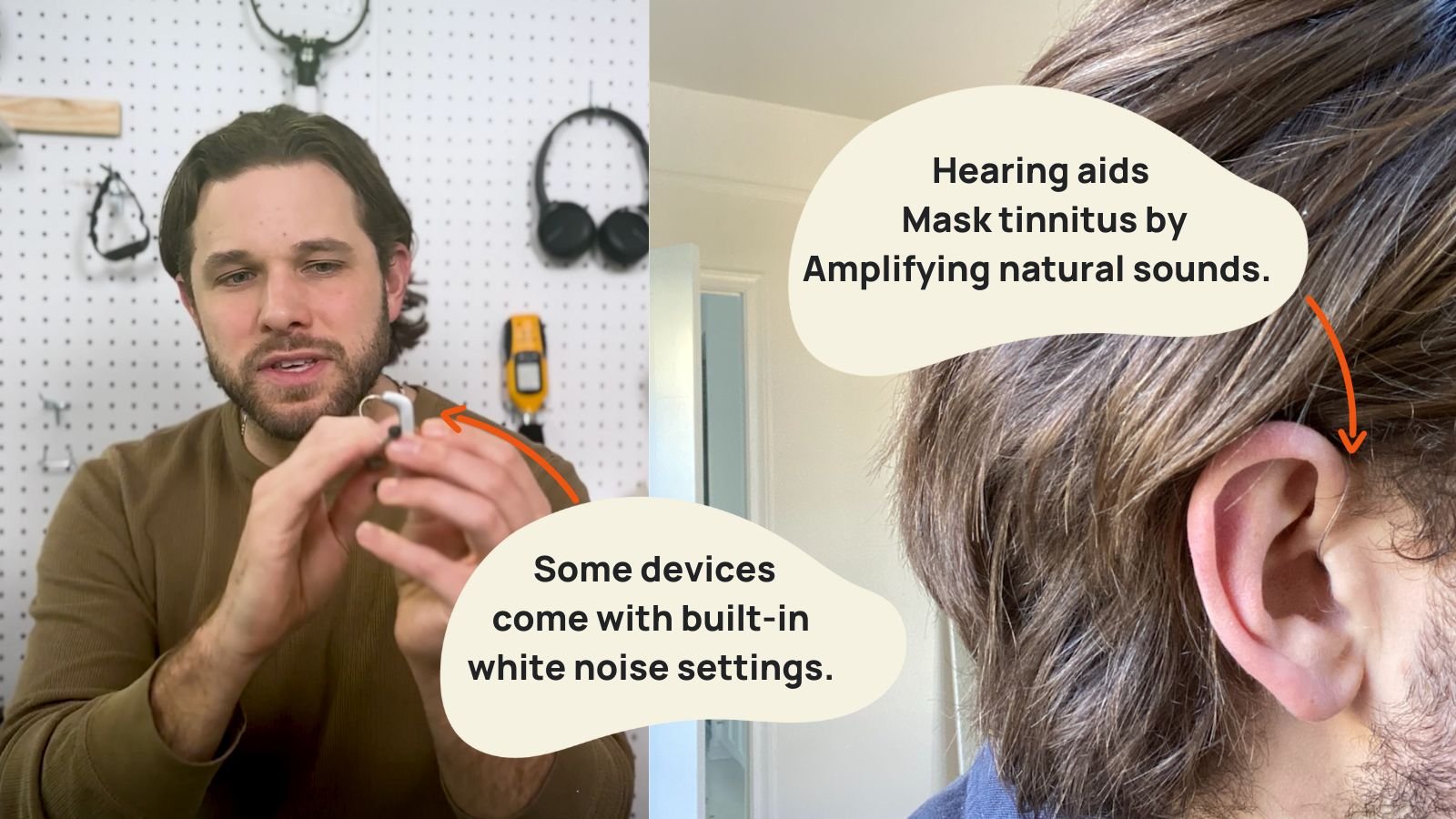
Hearing aids can play a critical role in managing tinnitus. Here are some of the key ways they help alleviate the symptoms:
- Amplifying External Sounds: By making external sounds louder, hearing aids can mask the internal sounds of tinnitus, making them less noticeable.
- Sound Therapy: Many modern hearing aids come with customizable or built-in sound therapy programs that provide soothing noises or white noise to help mask tinnitus symptoms. A hearing care provider can create a masking program that is centered around your specific tinnitus perception for a targeted approach.
- Neural Stimulation: Consistent auditory stimulation through hearing aids can help retrain the brain to focus less on tinnitus and even help to lessen it over time with consistent wear.
It might seem counterintuitive—if you're hearing a sound in your ear, don't you want to hear less rather than more? But as the video above explains, it's the brain's "craving" for sound that leads to that undesired noise.
When the brain gets some of that sound it craves, you may notice less of that squealing, buzzing or hissing sound.
It can take some time to lessen your tinnitus perception. However, there are also some more immediate effects of hearing aids that can provide relief.
Hearing aids work by amplifying conversation and ambient sounds, which can help mask the tinnitus in addition to providing the auditory stimulation that your brain is seeking.
Additionally, modern hearing aids come equipped with tinnitus management features for more strategic tinnitus masking, such as customizable sound therapy, which offers further relief tailored to your specific needs.
These advanced devices not only improve your overall hearing but also significantly enhance your quality of life.
Two Patient Journeys: Jane and Paul
Tinnitus is unique, and not everyone responds in the same way. To illustrate the typical tinnitus treatment process, I’ll share two real-world examples from patients who visited me in the clinic (anonymized for confidentiality).
Jane's Story
Jane, active woman in her mid-forties, first began to notice a faint, static-like whistling when her surroundings were particularly quiet.
Jane suffered a sudden hearing loss in her left ear and sought treatment for it with an ENT.
She was treated with a course of steroids, but unfortunately there was minimal recovery of her hearing following treatment.
Along with the onset of her hearing loss, Jane noticed a high-pitched whistling noise. At first, she dismissed it as a minor annoyance, and hoped she would just get used to it or perhaps it would go away.
However, as several months went by, Jane found that the whistling sound had become more pronounced and persistent, subtly infiltrating her daily life.
Some nights, Jane could fall asleep without much trouble, almost forgetting the sound. But on other nights, falling asleep became a challenge.
The whistling sound was particularly difficult to ignore at night, making it difficult for her to relax and drift off into a restful sleep.
Her husband noticed that the sleep issue was taking its toll and encouraged her to do something about it.
Frustrated by nights of disrupted sleep, the increase in frequency and intensity of the static-like whistling prodded Jane to seek professional advice, hoping to find some relief from her increasingly disrupted peace.
I talked to Jane about her unilateral hearing loss and how it was contributing to her brain creating this whistling sound.
Jane didn’t feel like her hearing was problematic, for the most part, but she was definitely motivated to start a hearing aid trial if it could lessen the sound.
I fit her with a hearing aid and encouraged her to wear it every day during her waking hours to give her the best chance at lessening the tinnitus perception during her trial period.
The first two weeks were definitely an adjustment, and Jane wasn’t sure that she noticed a difference. At the one month mark, she reported that the whistling sound, while not completely gone, had lessened in intensity.
At that point, Jane had adjusted to the hearing aid, so we added in a custom tinnitus program for her to try if her tinnitus was bothering her.
While not a cure, Jane did find some relief from this approach and her hearing aid in combination with stress management and good sleep hygiene helped quite a bit.
Paul's Experience
Paul, a 55-year-old semi-retired engineer, had always prided himself on his sharp mind and keen problem-solving skills.
But recently, a persistent sound in his ears had begun to disrupt his peace. This noise fluctuated from a low hum to a cricket-like chirp, and it had been growing worse over the past year.
Paul, ever the researcher, took to the internet and read extensively about tinnitus. He discovered that some people found relief with hearing aids, but he remained skeptical about their effectiveness.
As the noise nearly drove him to his wit's end, Paul decided it was time to consult a professional and scheduled an appointment with my office.
During the visit, we conducted a thorough hearing test and found that Paul had a mild to moderate high-frequency hearing loss.
We talked about hearing aids, explaining how they could potentially help manage his tinnitus. Paul had a lot of questions and remained skeptical but open.
Initially, Paul was disheartened when the first six weeks passed without noticeable improvement and adjusting to the 'tinny' sound of his hearing aids.
He began to wonder if he had made the right decision. I explained that it can take time until tinnitus lessens, and I encouraged him to keep at it.
We added in a customized tinnitus program to his hearing aids, that was centered around the frequency of his hearing loss (and also tinnitus).
Then, around the two-month mark, something changed. One peaceful evening, after removing his hearing aids, Paul realized that the relentless noise had significantly diminished.
For the first time in a long while, it was very quiet. This small victory was the glimmer of hope Paul needed, reassuring him that sometimes, persistence and patience do pay off.
Pros of Using Hearing Aids for Tinnitus
Hearing aids offer a multitude of benefits that go well beyond the relief of tinnitus symptoms:
Pros
- Neural Retraining: Consistent auditory stimulation from hearing aids can potentially retrain your brain to focus less on tinnitus over time or even reduce the internal tinnitus perception.
- Masking Tinnitus: By providing soothing sounds or white noise, hearing aids can help mask the internal noise from the tinnitus.
- Improved Hearing: Hearing aids amplify conversation and environmental sounds, which can significantly improve your overall hearing and reduce listening effort.
- Enhanced Quality of Life: Better hearing and reduced tinnitus can lead to a more enjoyable daily life, including improved social interactions and reduced stress.
Cons
While there are plenty of positives with hearing aids, it's essential to consider some potential drawbacks:
- Cost: Hearing aids can be expensive, and the initial investment might be a barrier for some. We’ve included some more budget-friendly options below.
- Adjustment Period: It might take some time to get used to wearing hearing aids and experiencing their full benefits.
- Maintenance: Regular maintenance is required to keep the hearing aids functioning optimally, which could involve additional costs or inconvenience.
- Not a Cure: While hearing aids can alleviate symptoms, they are not a cure for tinnitus and may not work for everyone.
By weighing these pros and cons, you can make a more informed decision about whether hearing aids are the right choice for managing your tinnitus.
OTC vs. Prescription Hearing Aids For Tinnitus
Both over-the-counter (OTC) and prescription hearing aids can help manage tinnitus, but they differ in several ways. Let's break down prescription versus OTC.
Prescription Hearing Aids
Prescription hearing aids can cater to a wide range of hearing loss, from mild to profound. Your clinician will ensure that your hearing aids are properly fit to your unique hearing loss.
One advantage of these devices is the ability for your clinician to create custom tinnitus masking programs tailored specifically to your unique tinnitus frequency. This allows for seamless phone calls and audio streaming directly into their ears, enhancing convenience and sound clarity.
However, it's important to acknowledge some drawbacks associated with prescription hearing aids. These devices generally come with a higher cost compared to OTC options.
Additionally, they require scheduling regular clinic appointments for fittings, adjustments, and maintenance, which could be less convenient for those with busy schedules.
If you have the budget, prescription devices with customizable masking programs are probably worth the upgrade to prescription care for a more tailored, personalized experience.
Now let's recap the pros and cons with prescription hearing aids.
Pros:
- Fit to Your Hearing Loss: Prescription hearing aids are tailored to your specific hearing loss, ensuring an optimal fit and enhanced performance.
- Tinnitus Masking: Customized programs designed by your clinician can provide targeted relief from tinnitus.
- Advanced Features: These devices often come with advanced technological capabilities like Bluetooth connectivity, allowing for seamless phone calls and audio streaming.
- Professional Support: Ongoing support from hearing care professionals ensures that your hearing aids provide the best possible outcomes.
Cons:
- Higher Cost: Prescription hearing aids typically come with a higher price tag compared to OTC options.
- Regular Clinic Visits: Fittings, adjustments, and maintenance require regular appointments, which can be inconvenient for those with busy schedules.
Over-the-Counter (OTC) Hearing Aids
OTC hearing aids are designed for adults with mild to moderate hearing loss and can be purchased without a prescription. They are generally more affordable and offer a convenient, quicker purchasing process.
While they can treat your mild to moderate hearing loss, tinnitus masking programs are often not available.
However, as mentioned above, treating your hearing loss helps treat tinnitus.
That being said, OTC devices usually do not provide the same level of customization or professional support as prescription hearing aids. Users may receive some support through customer service.
By understanding the differences between prescription and OTC hearing aids, you can make an informed decision on which option might be better suited to your tinnitus management and overall hearing health.
Let's recap the pros and cons with OTC hearing aids.
Pros:
- Affordability: Generally less expensive than prescription hearing aids.
- Accessibility: Easier to purchase without needing a medical prescription.
- Convenience: Quick and straightforward buying process.
Cons:
- Self-Fit: Often require some tech-savvy to set up the devices using a smartphone.
- No Masking Sounds: Often lack white noise streaming options.
- Limited Professional Support: Limited access to professional advice and adjustments.
How to Mask Tinnitus if You Aren't Ready For Hearing Aids
If you aren't ready to try hearing aids, don't worry—there are still several effective strategies you can explore to manage your tinnitus. Here are some alternatives that might provide relief:
Alternative #1 - DIY Tinnitus Masker Options
A quickly growing number of households now have smart speakers throughout their home. If you have a smart speaker in your house, try playing ambient brown or white noise.
Of course, you can try music, podcasts as well. If you are tech curious, you might even want to play with this tinnitus focused Alexa skill that plays custom frequencies based on the tinnitus sound you hear.
Another easy DIY option is to purchase a pair of wireless headphones like Airpods and tune into a tinnitus app (or your favorite music).
The ReSound iPhone app works with standard headphones in addition to working with their hearing aids. Use of personal headphones is especially helpful if you are considering hearing aids in the future and want to test out the ReSound system.
Finally, don’t forget that a strong fan or humidifier could be a low tech mask for your tinnitus. This might sound too good to be true but even a small amount of noise, especially at night, can make a difference.
Alternative #2: Tinnitus Masking Sound Machines
Many people with tinnitus choose to use a sound machine placed by your bed or in your home’s common areas. A masking device for tinnitus is straightforward to use and offers multiple sound options, which can help find the right sound and frequency for your tinnitus. These are a few of our favorites:
LectroFan Sound Masking Device - $45
This tinnitus friendly sound machine gets rave reviews on Amazon for its simplicity and range of settings. It has over 20 different sounds to reach different tinnitus frequencies. Check out this video for a full unboxing review.
Read more on Amazon
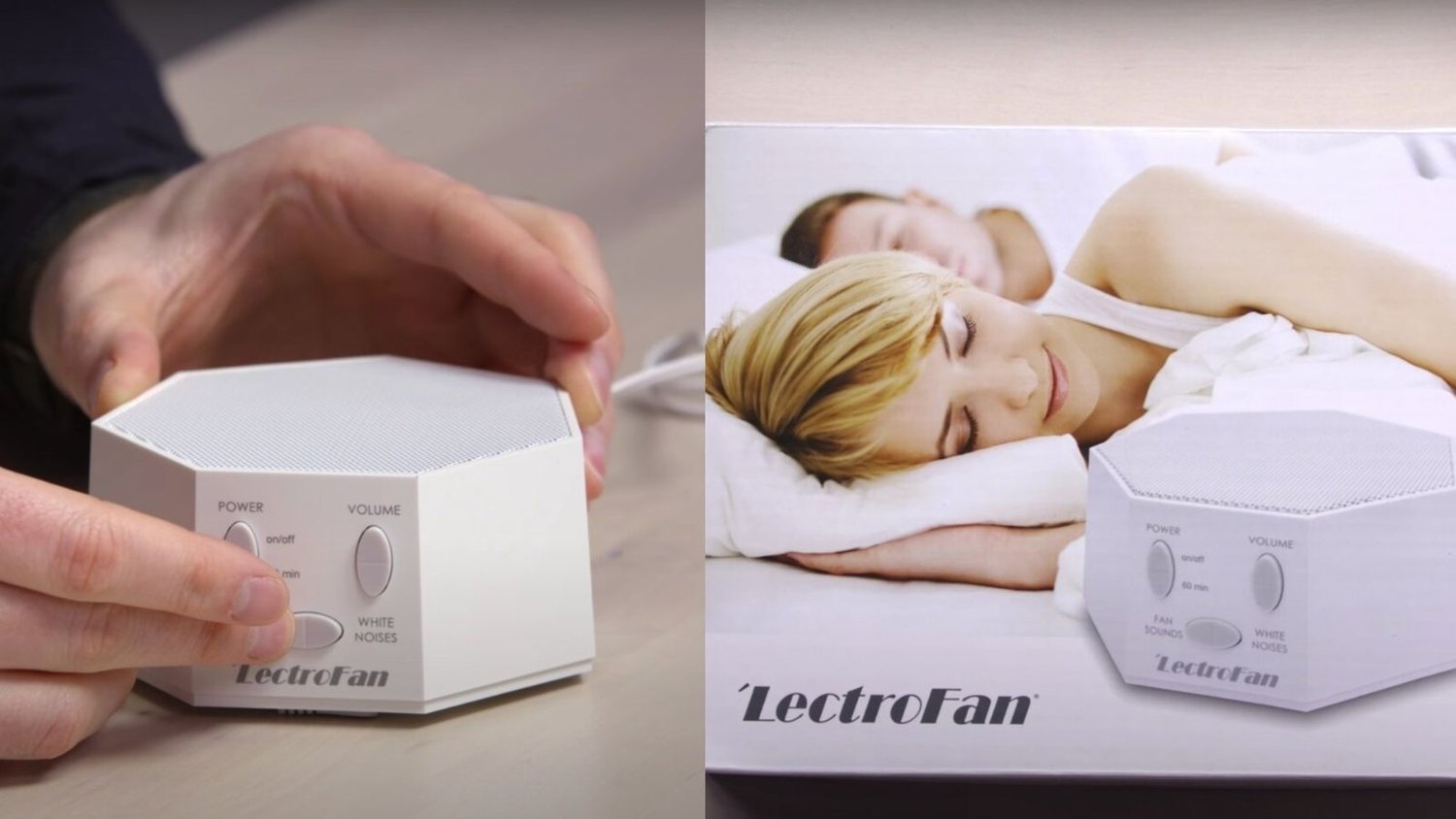
SNOOZE Smart Tinnitus Masking Sound Machine - $79
The SNOOZE tinnitus masking device makes this list for its mix of modern design and old fashion technology. It is one of the only sound machines that uses a real fan instead of a digital sound.
This low tech approach results in a very natural sound adjusted by manually twisting the device.
The SNOOZE has 10 sounds, including a tone specifically for tinnitus masking. You can watch a full YouTube tutorial here.
Read more on Amazon
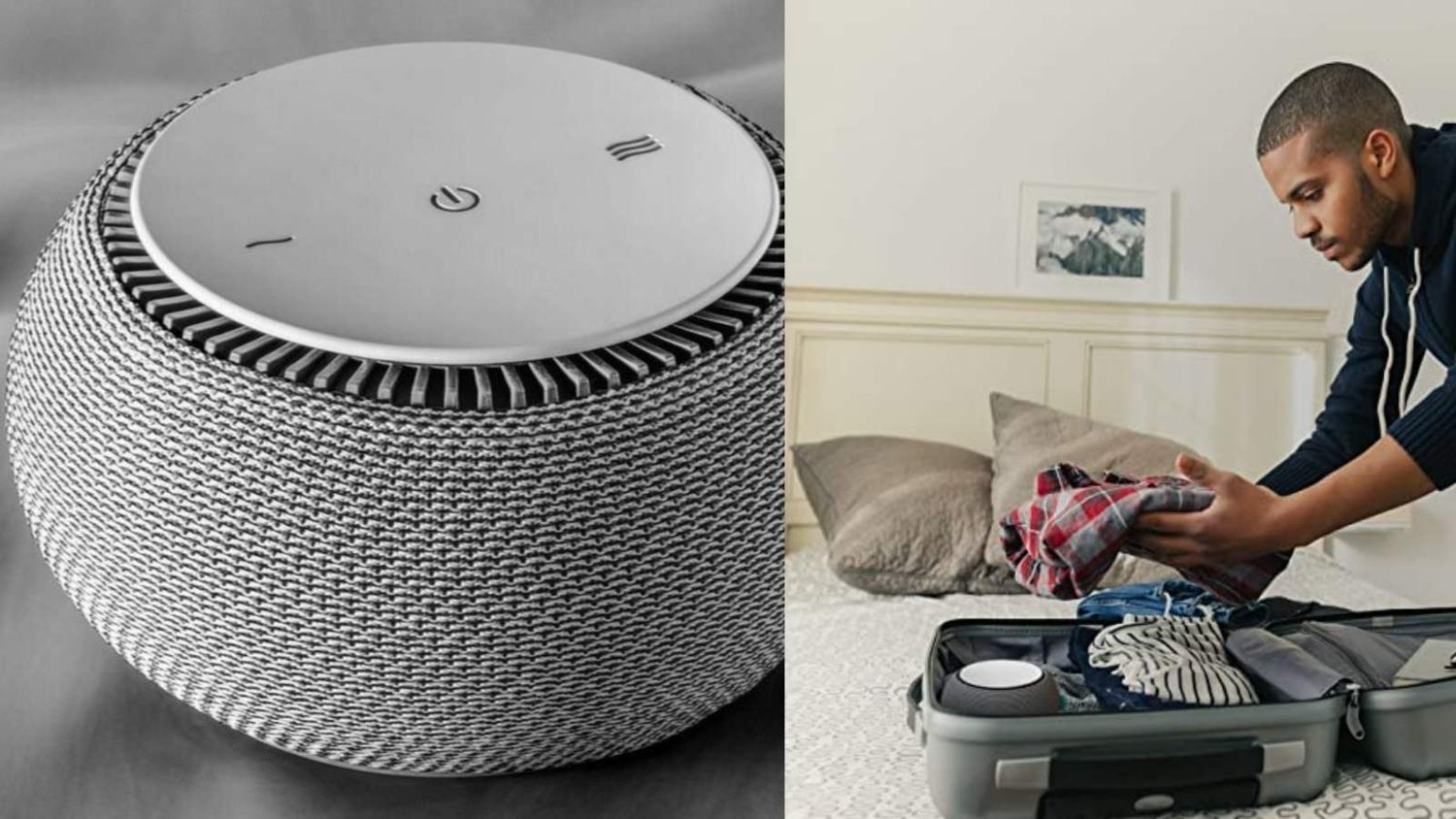
LectroFan Micro2 - $33
Another favorite from LectroFan, the Micro2, makes the list for its travel-friendly size.
The device has 11 sound settings, can operate without being plugged in for up to 40 hours of sleep time, and allows you to stream audio from your phone.
Read more on Amazon
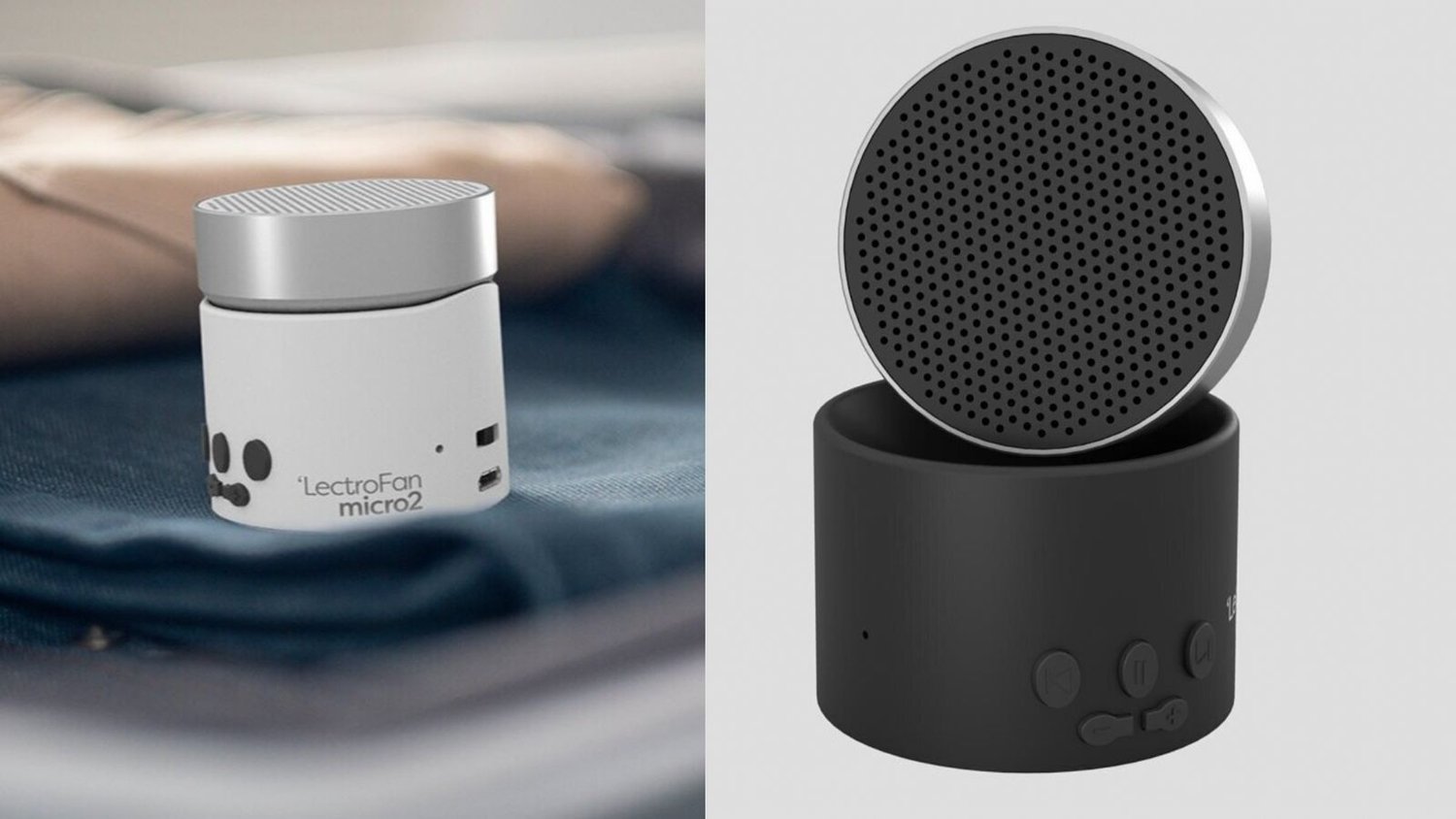
Final Thoughts
We hope this information has been helpful. If you suffer from tinnitus, know that you are not alone and that most people eventually find solutions that reduce their symptoms. If you are just getting started on your journey, consult your doctor and people you trust.
Look critically at quick-fix solutions that pop up online and be patient with yourself. You might also like these tips for at-home tinnitus treatment.
If you have any questions, we'd love to hear from you at [email protected].

